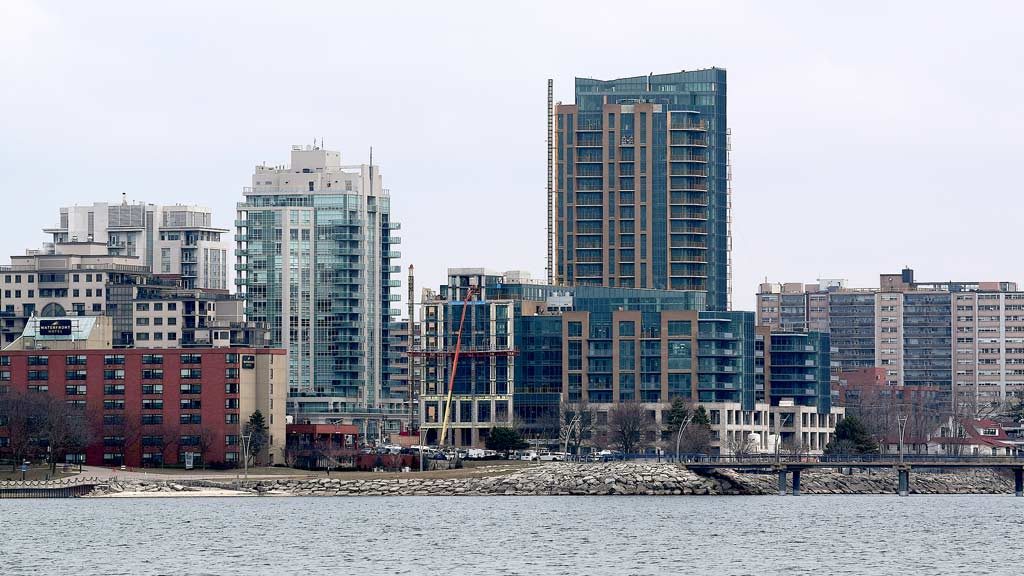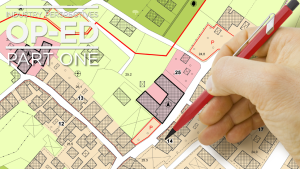Burlington, Ont. is into the second year of a development freeze that has seen proposals valued possibly in the billions put on hold.
Mayor Marianne Meed Ward was elected to the job in October 2018 with a mandate to curtail the growth of highrises in the downtown. When in February of that year the Ontario Municipal Board (OMB), an appeal agency, released its decision to allow development of a 26-storey condo building on Martha Street downtown, then councillor Meed Ward called the decision “absolutely devastating.”
By February 2019 Burlington city council had approved an Interim Control Bylaw (ICBL) Land Use Study, which froze development for one year in downtown Burlington and at the Burlington GO station effective March 5 of that year while the City could review its planning policies.
With the hold now extended past the March 5, 2020 deadline, an extension triggered by 31 appeals of a recently approved Official Plan (OP) amendment and zoning bylaw, developers like the Molinaro Group remain sitting on expensive pieces of property in and near the downtown with losses mounting daily.
“The ICBL is not good for the industry or for the local homebuyers,” commented Molinaro Group president Vince Molinaro recently.
“I don’t agree with how they’ve gone about this. We have a liaison committee with them that meets regularly, they could have told us their issues, they could have sat down and had some discussion, but without notice they brought in the ICBL, which shocked us all and sent us scrambling. It’s not right,” said Molinaro.
The Molinaro Group alone has four planned developments affected by the freeze, one of which, the Paradigm project near the Fairview Street GO station, had received zoning approval and only required site plan permits when the hold was imposed.
The hold on development also hurts housing affordability, Molinaro said.
“You clamp down on choice and guess what, affordability goes out the window,” he remarked.
Molinaro, who in February was inducted into the West End Home Builders’ Association Hall of Fame, said he estimated the value of the projects on hold to total in the billions.
Meed Ward said she has doubts on that figure: “I have no evidence to suggest that is a specific number.”
She said her responsibility is to “take the holistic, city-wide, downtown-wide view of what good planning is…while protecting what deserves protecting in the downtown.”
Meed Ward said Burlington had what were considered perfectly adequate OP measures in place as of 2008 that met the downtown density dictates established by the province’s Places to Grow policy and the Provincial Policy Statement on growth. Burlington’s downtown was well on its way to meeting 2031 Downtown Urban Growth Centre (UGC) density targets of 200 people or jobs per hectare.
But the City realized it needed more planning tools, Meed Ward explained, after the OMB relied on another density-related guideline, the Major Transit Station Area (MTSA) designation, to justify approving downtown building heights several times the single-digit limit previously thought to be permitted by the Official Plan (OP).
This, she said, even though the downtown MTSA consists of a ticket kiosk and bus shelter.
Meed Ward proposed seven steps the City should take to get its planning process back in control. Among them — review the suitability of the MTSA and UGC designations downtown; and advocate to eliminate the Local Planning Appeal Tribunal (LPAT), successor to the OMB.
OP amendment (OPA) 119, approved by council Jan. 30 and based on recommendations in a City-commissioned report, creates a definition of an MTSA that would ensure the designation would never again be used to justify 26 storeys in the downtown, the mayor explained.
Zoning bylaw amendment 2020.418, which focused on development near the GO station, was also approved Jan. 30.
Next to come: another proposed OPA, due for a vote in April, that would redefine major districts downtown and further north with what Meed Ward says are generous and expanded height restrictions at appropriate sites.
As an example, she said, Brant Street, the downtown’s main street, is currently zoned to permit four storeys with permission to go to eight negotiable with strong planning arguments; that would be changed to permit a three-storey podium with an 11-storey tower set back 20 metres.
At Ghent and Prospect, further north, towers of 25 storeys would be permitted.
Meed Ward said she has no sympathy for developers who bought lands downtown hoping to follow the path of recent developers who used the OMB/LPAT to “blow by” the OP and score approval for building heights in the downtown that are two, three and four times what was permitted in the OP.
“What we have seen is land speculation,” she said. “There has been certainty in our plan since 2008. Developers who bought land based on what was in the plan…if they had come in for a building permit they would be built and making money.”
Both Meed Ward and Molinaro said they hoped negotiations could lead to the Paradigm project being removed from the restrictions of the ICBL at some point since building height and other issues are not contentious near the GO station.
Meed Ward explained that once the appeals of zoning bylaw 2020.418 have been dealt with, the ICBL freeze will be lifted. Under the Planning Act, the ICBL can only be extended one year.
But Molinaro said he feared appeals of the next OP amendment, which following Burlington council consideration in April would have to be voted on by Halton Region council, could extend the development freeze beyond the next year.
“We hope as a Burlington taxpayer we are not spending years and years and millions of dollars to fight all these developers,” he said. “I hope that saner heads prevail and everyone comes to the table and reaches some resolutions.”
Lawyer Denise Baker of the firm WeirFoulds made representations to Burlington council regarding OPA 119 and the related zoning bylaw on behalf of Welwyn Interests Inc. on Jan. 21. Baker identified numerous issues and claimed that the policies were contrary to the province’s Growth Plan. Asked for comment, Baker wrote, “We have filed multiple appeals to OPA 119 on behalf of various landowners and will allow the LPAT process to play out.”
Follow the author on Twitter @DonWall_DCN.











Recent Comments